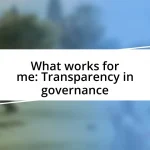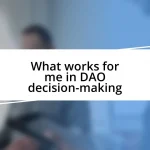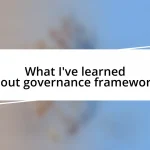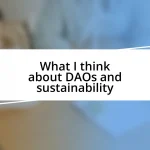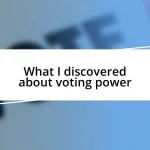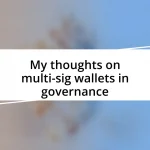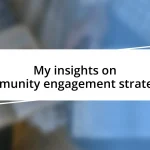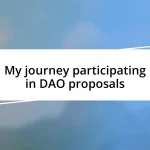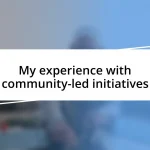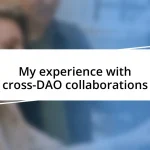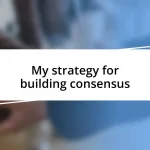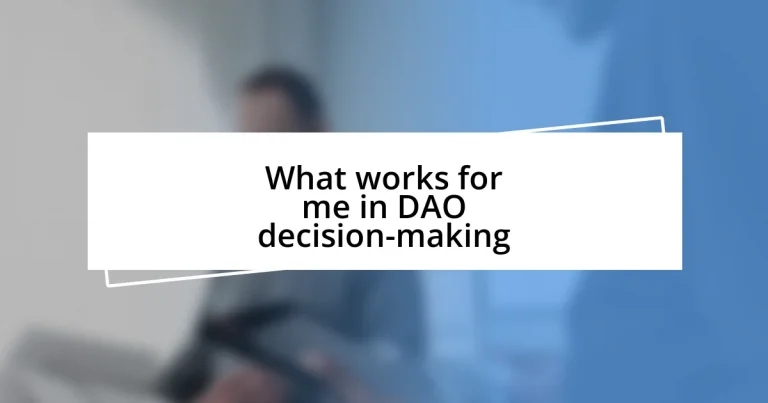Key takeaways:
- Inclusivity and diverse perspectives in DAO decision-making enhance creativity and foster deeper connections among members.
- The integration of effective tools like blockchain voting systems and project management platforms improves communication, organization, and engagement within DAOs.
- Analyzing decision outcomes and member feedback promotes continuous improvement, adaptability, and informs future governance strategies in DAOs.
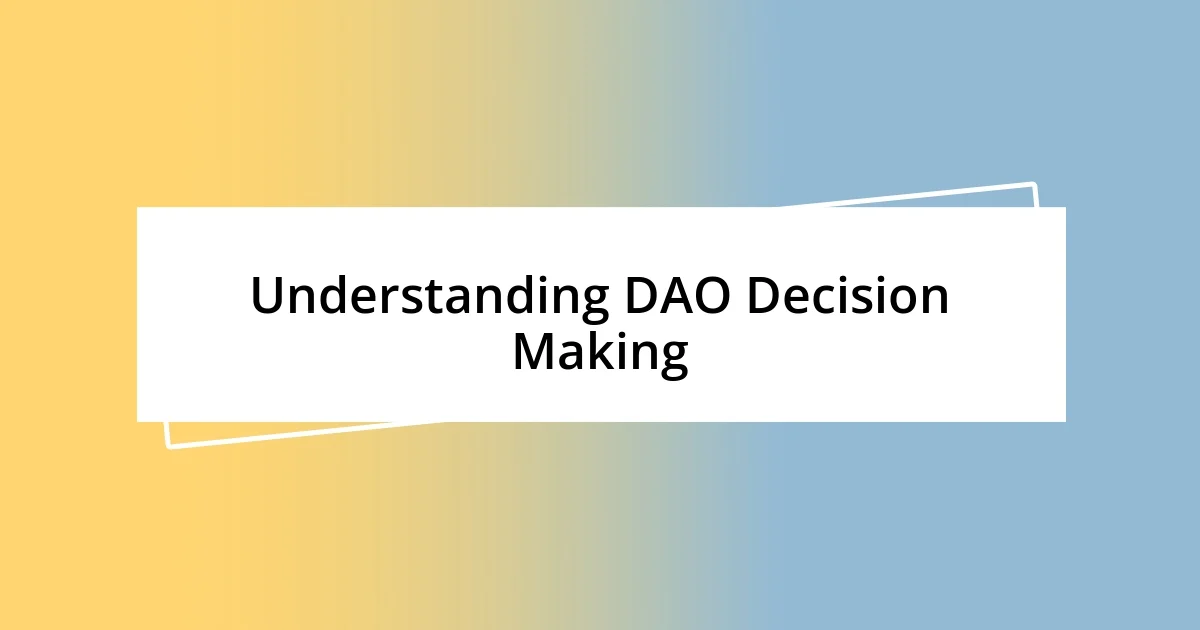
Understanding DAO Decision Making
Understanding DAO decision-making can feel like navigating a complex maze. In my experience, it thrives on collective input, which can sometimes make it challenging to reach a consensus. Have you ever felt overwhelmed by too many opinions? That’s a common sentiment when everyone’s voice matters, leading to the necessity of clear communication protocols.
Moreover, the transparency of the process is a double-edged sword. I remember a time when every proposal seemed like an open book, creating a sense of community engagement but also a pressure to meet the expectations of the entire group. It’s fascinating how accountability in these structures can spur innovation, but what happens when that pressure stifles creativity?
Finally, the tools we use to facilitate these discussions significantly impact our effectiveness. I find that platforms designed for voting and collaboration can either enhance or hinder the experience. Have you tried different tools? Some might work great for simplicity, while others can get bogged down in complexity. Understanding the right balance is crucial for meaningful participation in DAO decision-making.
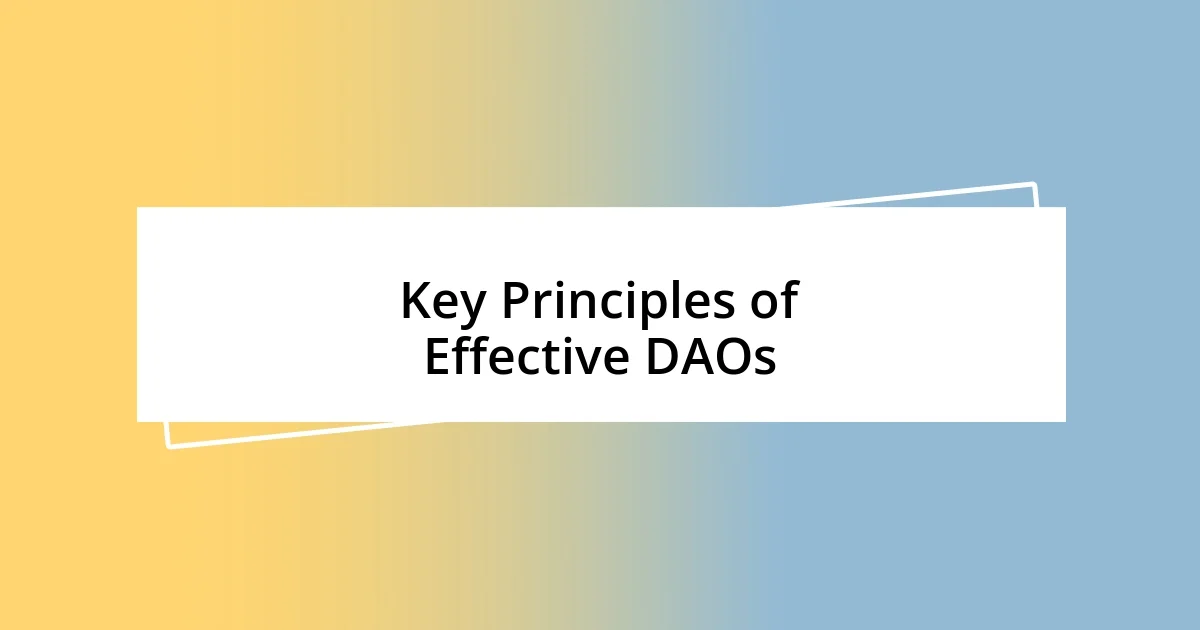
Key Principles of Effective DAOs
The foundation of effective DAOs rests on a few key principles that I’ve learned through my own experiences. For instance, inclusivity has been pivotal; everyone should feel empowered to share their insights, drawing from a diverse range of perspectives. I recall a specific project where an unconventional idea from a quiet member changed the trajectory of our discussion, illustrating just how vital those varied voices are in shaping our decisions.
Key Principles of Effective DAOs:
– Inclusivity: Making space for all voices ensures a variety of ideas and solutions.
– Transparency: Open communication about processes builds trust and accountability.
– Decentralization: Distributing power prevents decision-making bottlenecks.
– Adaptability: Remaining flexible to change helps the DAO embrace new ideas and challenges.
– Clear Protocols: Well-defined processes facilitate smoother discussions and decision-making.
Having a defined structure doesn’t stifle creativity—it actually enhances it! I’ve seen firsthand how transparent discussions can lead to innovative solutions when everyone knows the rules of engagement. In one of my past DAOs, we established a simple guidelines document that everyone could reference, which resulted in fewer misunderstandings and more productive conversations. It’s these little adjustments that can significantly change the dynamics of decision-making in a DAO.
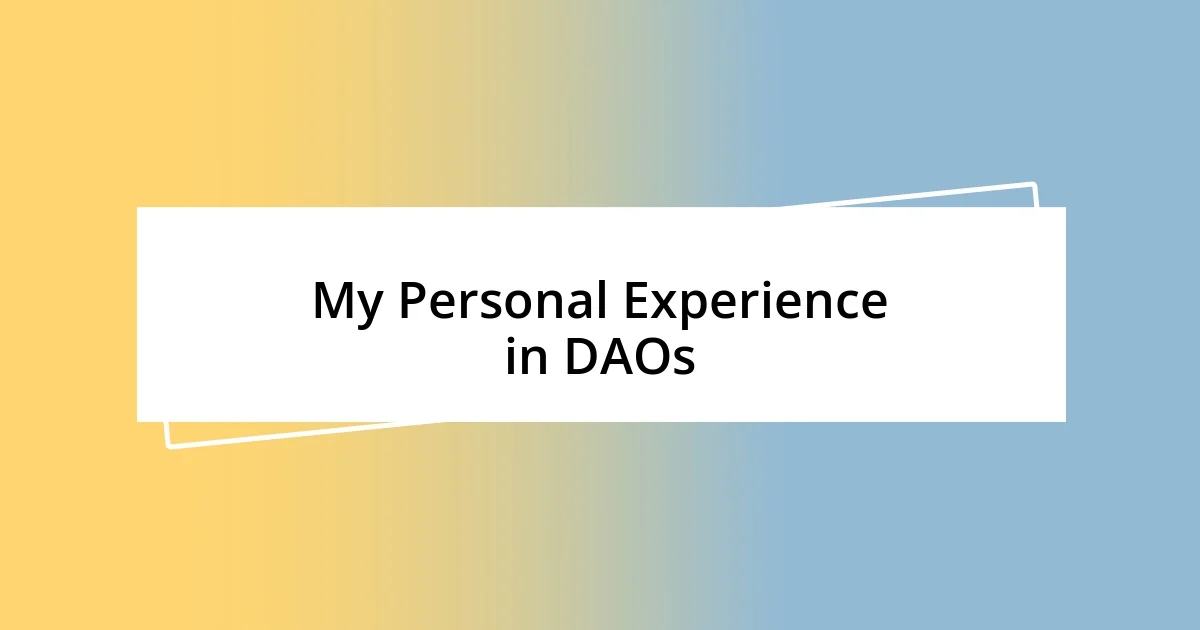
My Personal Experience in DAOs
My journey in DAOs has been a transformative experience. Each time I participate in a decision-making process, I find myself reflecting on the dynamics of collaboration. For instance, during a critical proposal discussion, I noticed how my initial hesitation to voice a controversial opinion turned into an opportunity for growth. When I finally shared my thoughts, the conversation shifted in ways I had never anticipated, making me realize the importance of pushing past one’s comfort zone.
One memorable moment happened when our DAO tackled an urgent community issue. I remember the intense debate that unfolded over differing viewpoints. At first, it felt chaotic, but slowly, as we all shared our perspectives, I felt a sense of unity forming. It solidified my belief that although disagreements can be challenging, they often lead to the most profound insights, fostering a deeper connection among members.
Reflecting on my experiences, I can’t help but emphasize the value of mentorship within DAOs. Being mentored by more seasoned members helped me navigate my contributions. Their encouragement pushed me to delve into areas I previously shied away from. This guidance doesn’t just enhance individual involvement but enriches the entire DAO, reinforcing the idea that sharing knowledge and experience can lead to better decision-making outcomes.
| Aspect | My Personal Insight |
|---|---|
| Inclusivity | Every voice matters; I realized my unconventional idea sparked a vital discussion. |
| Community Engagement | Transparency can create pressure, yet it also inspires collective responsibility. |
| Mentorship | Guidance from experienced members can significantly elevate one’s contributions. |
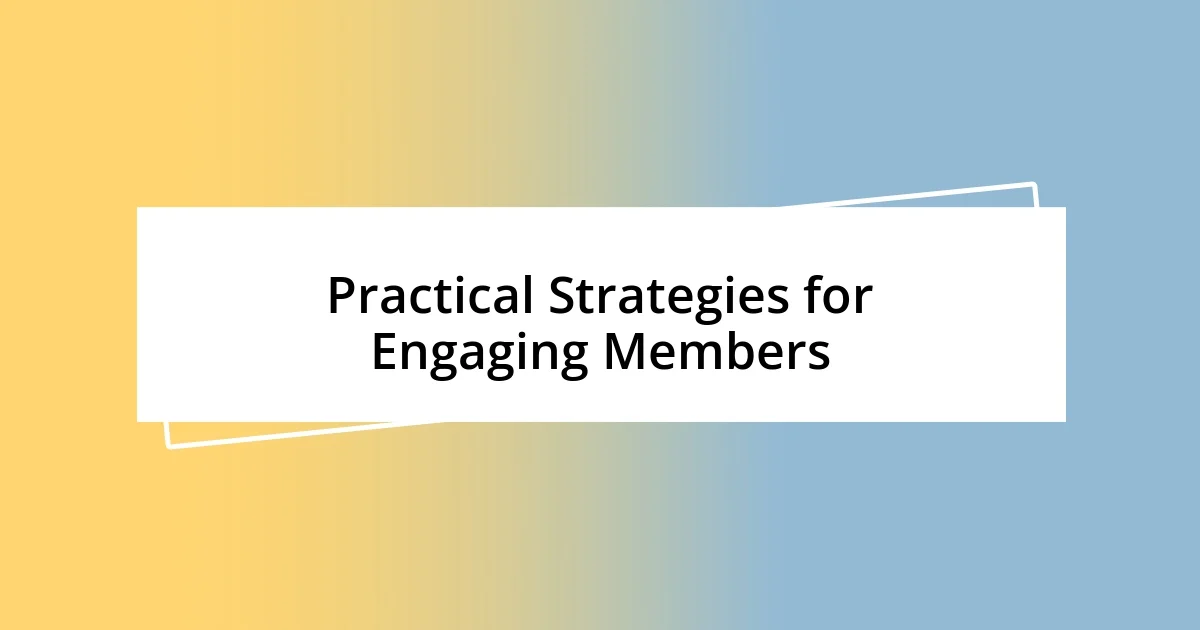
Practical Strategies for Engaging Members
To engage members effectively, I’ve learned the power of creating regular touchpoints. For instance, in one DAO, we set up bi-weekly casual meet-ups—nothing formal, just a relaxed space where everyone could share updates and thoughts. I found that these informal settings not only fostered deeper connections but also encouraged shy members to contribute in ways they wouldn’t during structured meetings.
Another strategy that works wonders is recognizing contributions publicly. When someone shares a thoughtful insight or goes above and beyond in their role, acknowledging that effort creates a ripple effect. I remember a specific time when I publicly thanked a member for their hard work on a project; it was amazing to see others step up with their own ideas afterward. It really reinforced that everyone’s input is valued and encouraged.
Additionally, I strongly believe in the importance of feedback loops. After every project or major discussion, I’ve found that sending out a quick survey can yield invaluable insights. By asking members about their experiences and suggestions, I not only show that their opinions matter, but I also gather ideas to improve future engagements. Honestly, some of the best practices I’ve implemented came directly from those surveys, illustrating that fostering engagement is an ongoing process that evolves with member input.
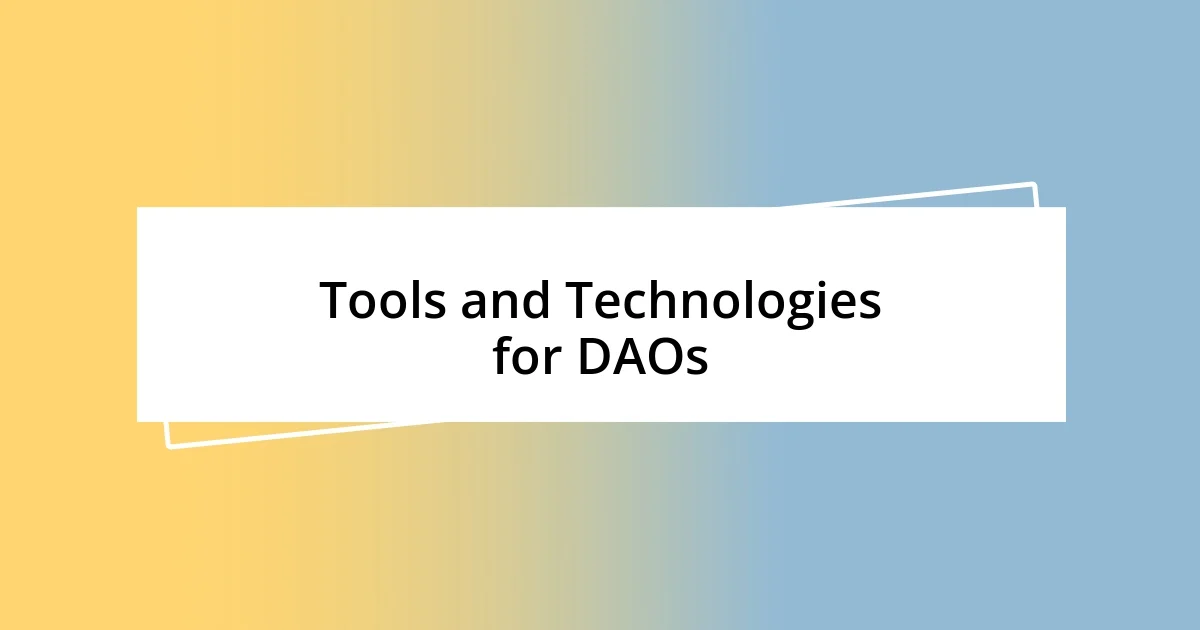
Tools and Technologies for DAOs
In my experience, leveraging the right tools and technologies has been a game-changer in DAO decision-making. For instance, I found that platforms like Discourse and Discord have not only facilitated effective communication but also fostered a strong sense of community. These tools provide spaces for open discussions, allowing members to share ideas and voice opinions easily—even when some might feel hesitant to speak up in formal settings.
Another essential technology I’ve come to value is blockchain-based voting systems, such as Snapshot. I remember participating in a crucial vote where Snapshot made the entire process transparent and straightforward. It was empowering to see how every vote was recorded immutably, reinforcing trust within our DAO. Having these voting mechanisms helps ensure that every member’s voice is heard and valued, crucial for building a stronger community.
I also can’t overlook project management tools like Trello or Notion, which have proven invaluable for tracking proposals. Incorporating these platforms into our workflow transformed our efficiency. I vividly recall a time when we used Trello to manage a large initiative—having a visual representation of tasks and responsibilities made it easier for everyone to see where they could contribute. Isn’t it fascinating how the right combination of tools can elevate collaboration and ensure we stay aligned towards our common goals?
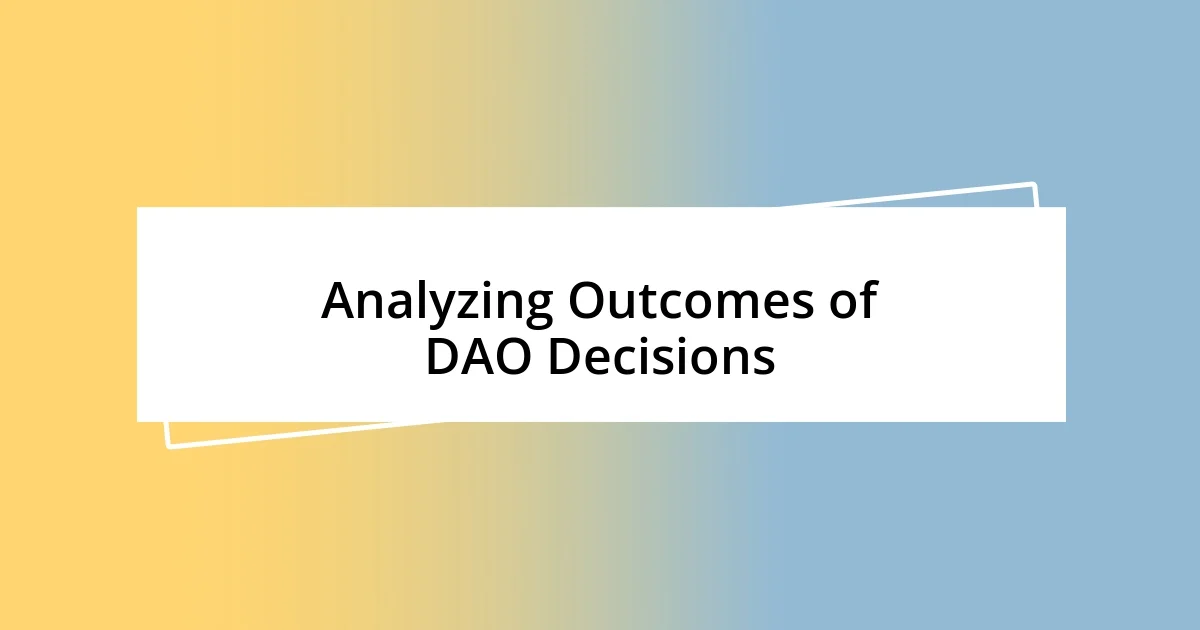
Analyzing Outcomes of DAO Decisions
Analyzing the outcomes of DAO decisions is truly an enlightening process. I’ve often found myself reflecting on how specific decisions not only impacted our goals but also shaped member engagement. For instance, after implementing a new voting system for project approvals, I noticed a staggering increase in participation. This wasn’t merely about more votes; it was about members feeling a deeper connection to the initiatives, feeling like their voices genuinely mattered.
When I take the time to analyze these outcomes, I dig into the data and member feedback. I remember a time when we rolled out a decentralized funding initiative. Initially, we were excited by the funding requests but quickly realized a pattern of similar proposals emerging. This realization prompted us to host a discussion where we could collectively refine our approach. The result? A more diverse range of projects that not only met our goals but also sparked creativity and innovation within our community.
On a more personal note, it’s fascinating how analyzing outcomes can also highlight areas for growth. There have been instances where I initially believed a decision was spot-on, only to later discover it missed the mark in engaging certain members. I can’t help but ask myself: what did we overlook? This reflective practice not only guides future decisions but also strengthens my understanding of the community’s evolving needs—turning every decision into a stepping stone for improvement rather than a stumbling block.
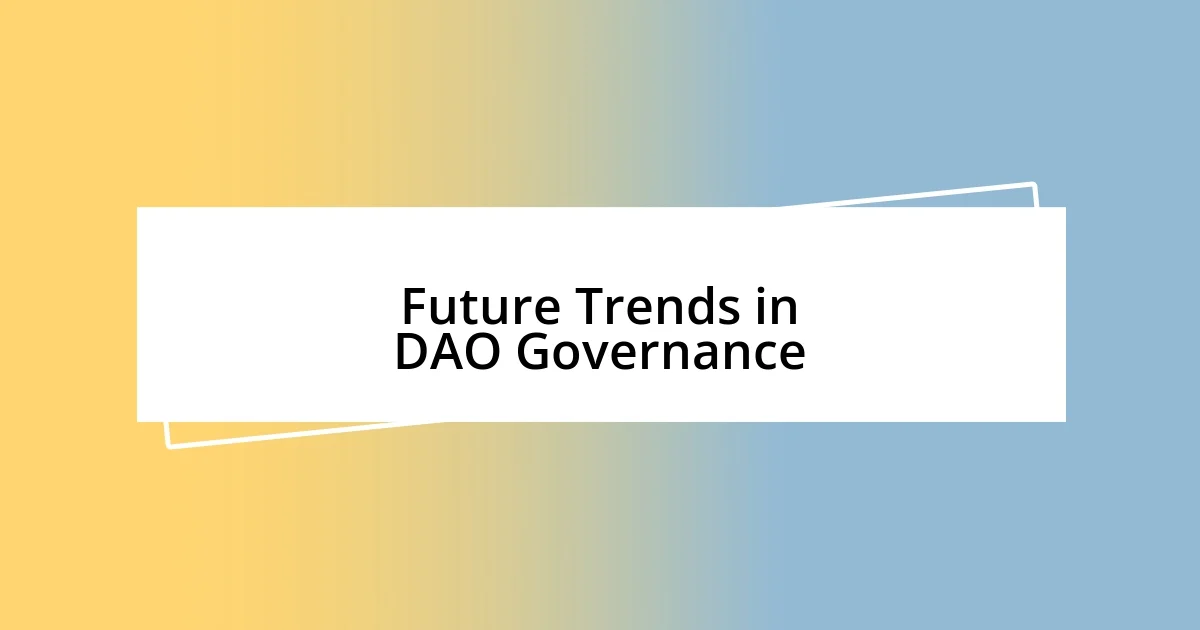
Future Trends in DAO Governance
Future trends in DAO governance are starting to reveal some intriguing possibilities. As I dive deeper into this space, it’s evident that the focus will shift towards greater inclusivity and diversity. Recently, during a brainstorming session, I suggested integrating a more representative voting structure that allows members from various backgrounds to bring forth their perspectives. Imagine the richness of decisions made when everyone’s voice truly counts—doesn’t that just sound like a game changer?
Moreover, I see a growing trend towards adaptive governance models that can respond to the unique needs of a DAO over time. This evolution reminds me of a project we undertook where we tested different governance frameworks for our decision-making processes. It felt liberating to witness the community adapting and customizing our approach based on real-time feedback. Isn’t it empowering to be part of a system that evolves with its members?
Finally, I anticipate a rising interest in hybrid models, merging traditional governance principles with innovative blockchain practices. Reflecting on my experience with such models, I remember feeling both nervous and excited when we tried incorporating aspects of traditional corporate governance into our DAO structure. It raised fascinating discussions about balance and accountability—don’t you think striking the right balance could unlock tremendous potential for DAOs? As we look forward, embracing these trends will be critical to our growth and sustainability.
